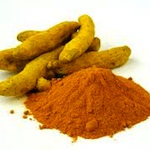It’s called “yellow kitchen” syndrome and I can understand why.
When I first started practicing, curcumin was just staring to become recognized as an anticancer agent. Because of it’s poor bioavailability, I would recommend that clients cook non-irradiated turmeric powder with butter and freshly ground pepper, in order to extract the curcumin. My clients then added heavy organic cream with lecithin to the concoction ….. we called it turmeric tea. This preparation style was my own invention at the time, based on traditional cooking methods.
The reason it was called “yellow kitchen” syndrome was that the turmeric would literally turn the walls of peoples kitchens yellow. I recommended that people drink a lot of it!
The turmeric tea worked though, for some of the most difficult cases, hence the curcumin … miracle!
Hardy, rest his soul, had metastatic liver cancer. He lived with the cancer for 3 years, before finally succumbing to the disease. He would come into the office with yellow stains down the front of his shirt and a big orange “milk” moustache! His oncologist was mystified at how long he survived.
In my years of practice I’ve helped quite a few cases with the turmeric tea, but many more patients have refused to use this treatment because of the mess it makes and the smell.
Over a year ago now, our clinic was one of the first places in North America to use intravenous curcumin. I started using it with a stage 4 metastatic colon cancer patient that was given 2 months to live. At 10 months, he stopped his treatments in favour of chemo.
This recent article, although outlining a fish study, suggests the power of curcumin in high intravenous doses. We provide intravenous curcumin frequently and the only thing clients have to worry about with this cleaner form of the treatment is the smell!
IV injection of aqueous curcumin inhibits colon cancer growth and kills cancer cells, research reveals
Posted by Natural News on December 9th, 2013
Let’s go over an interesting Chinese study conducted in 2011 on the effect of a uniquely derived delivery system with curcumin for cancer entitled “Curcumin loaded biodegradable polymeric micelles for colon cancer therapy in vitro and in vivo.”
In vitro literally means “in glass” and in vivo means in an alive creature of some sort. So they did both test tube and live animal experiments. Those live animals are usually mice or lab rats because of their genetic and other similarities to humans. This time, they used transgenic zebrafish, yes, the kind sold out of pet store fresh water aquariums.
It seems that enough genome similarity to lab rats and humans has been discovered with zebrafish recently. And researchers in the USA are using them also, especially for studying disease while looking for cures. Their genomes are easily manipulated to simulate human diseases.
Transgenic indicates that some sort of gene was inserted. In this case, it was probably the colon cancer genes. That’s the cancer on which they decided to try this micelle-encapsulated curcumin. It’s similar to liposomal encapsulation but slightly different in composition. The principle of encapsulating is the same.
It’s to enable what is normally broken down by digestive processes to continue into the blood stream and, more importantly, penetrate lipid cell walls that are resistant to liquid penetration using nanotechnology that creates supplement nanoparticles encapsulated in tiny lipid particles.
Here’s how Avanti Polar Lipids describes the difference: “Liposomes are composed of a lipid bilayer separating an aqueous internal compartment from the bulk aqueous phase. Micelles are closed lipid monolayers with a fatty acid core and polar surface, or polar core with fatty acids on the surface (inverted micelle).” Both serve the same function. Okay, you can wake up now.
The researchers observed dramatic reductions of angiogenesis, or blood vessels forming to support cancer tumors, in vivo, and they observed cancer cells killed in vitro.
Thus the Chinese study concluded that “micelles are an excellent intravenously injectable aqueous formulation of curcumin; this formulation can inhibit the growth of colon carcinoma through inhibiting angiogenesis and directly killing cancer cells.”
Learn more: http://www.naturalnews.com/043174_aqueous_curcumin_colon_cancer_IV_injection.html#ixzz2mzjvdB7G
